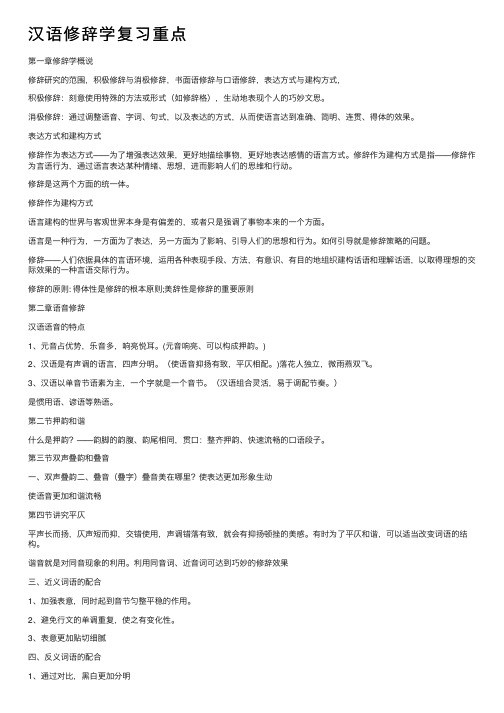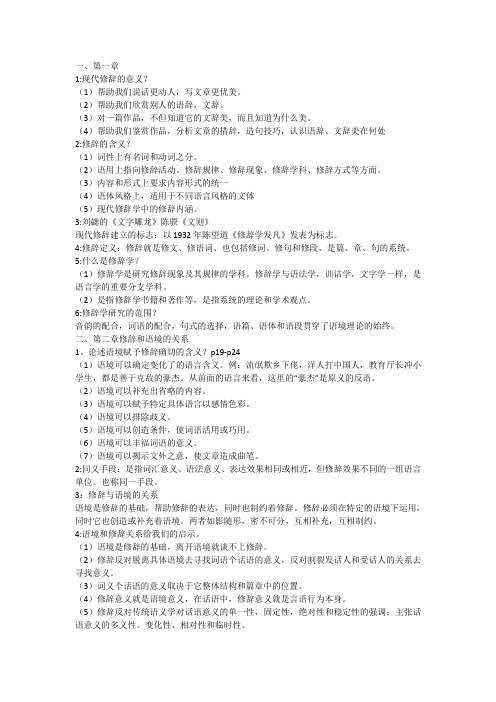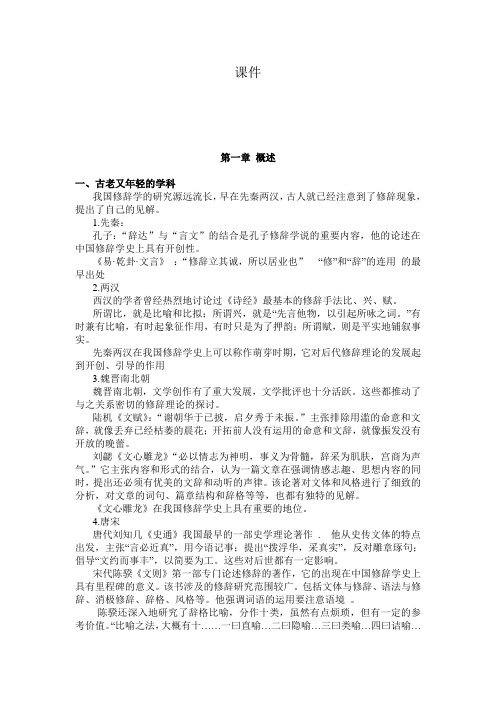修辞学第1-3章(2009)
汉语修辞学复习重点

汉语修辞学复习重点第⼀章修辞学概说修辞研究的范围,积极修辞与消极修辞,书⾯语修辞与⼝语修辞,表达⽅式与建构⽅式,积极修辞:刻意使⽤特殊的⽅法或形式(如修辞格),⽣动地表现个⼈的巧妙⽂思。
消极修辞:通过调整语⾳、字词、句式,以及表达的⽅式,从⽽使语⾔达到准确、简明、连贯、得体的效果。
表达⽅式和建构⽅式修辞作为表达⽅式——为了增强表达效果,更好地描绘事物,更好地表达感情的语⾔⽅式。
修辞作为建构⽅式是指——修辞作为⾔语⾏为,通过语⾔表达某种情绪、思想,进⽽影响⼈们的思维和⾏动。
修辞是这两个⽅⾯的统⼀体。
修辞作为建构⽅式语⾔建构的世界与客观世界本⾝是有偏差的,或者只是强调了事物本来的⼀个⽅⾯。
语⾔是⼀种⾏为,⼀⽅⾯为了表达,另⼀⽅⾯为了影响、引导⼈们的思想和⾏为。
如何引导就是修辞策略的问题。
修辞——⼈们依据具体的⾔语环境,运⽤各种表现⼿段、⽅法,有意识、有⽬的地组织建构话语和理解话语,以取得理想的交际效果的⼀种⾔语交际⾏为。
修辞的原则: 得体性是修辞的根本原则;美辞性是修辞的重要原则第⼆章语⾳修辞汉语语⾳的特点1、元⾳占优势,乐⾳多,响亮悦⽿。
(元⾳响亮、可以构成押韵。
)2、汉语是有声调的语⾔,四声分明。
(使语⾳抑扬有致,平仄相配。
)落花⼈独⽴,微⾬燕双飞。
3、汉语以单⾳节语素为主,⼀个字就是⼀个⾳节。
(汉语组合灵活,易于调配节奏。
)是惯⽤语、谚语等熟语。
第⼆节押韵和谐什么是押韵?——韵脚的韵腹、韵尾相同,贯⼝:整齐押韵、快速流畅的⼝语段⼦。
第三节双声叠韵和叠⾳⼀、双声叠韵⼆、叠⾳(叠字)叠⾳美在哪⾥?使表达更加形象⽣动使语⾳更加和谐流畅第四节讲究平仄平声长⽽扬,仄声短⽽抑,交错使⽤,声调错落有致,就会有抑扬顿挫的美感。
有时为了平仄和谐,可以适当改变词语的结构。
谐⾳就是对同⾳现象的利⽤。
利⽤同⾳词、近⾳词可达到巧妙的修辞效果三、近义词语的配合1、加强表意,同时起到⾳节匀整平稳的作⽤。
2、避免⾏⽂的单调重复,使之有变化性。
修辞学-第一章

三、修辞与语境
(一)语境的性质和构成
1、语境的性质 语境是语言存在和使用的环境。从理论上说,尚未使 用时的静态语言单位所处的环境和语言在使用状态下 所处的环境是不一样的,有人主张把前者叫做语言环 境,后者叫做言语环境。严格的说,语言使用既离不 开言语环境,也与语言环境有联系,换言之,这里区 分的所谓言语语境实际上往往部分或全部地含括了语 言环境。如“含沙射影”是含沙的语言环境,但我们 说“你别在这里含沙了”的时候,“含沙射影”也是 它的言语环境的一部分。 修辞是语言运用活动,修辞的语境是言语环境。
虚拟原则是虚实这对哲学范畴在语言运用中 的具体体现,是能指(言语形式和语义内容 的结合体)和所指(思维对象)辩证关系的 实际需要。
实践虚拟原则的修辞策略有二:以实写 虚和以虚写实。 以实写虚:语言形式是合乎常规的,所 描述的内容却是虚假的。如:精细 以虚写实:语言搭配是超乎常规的(不 合语法、语义、事理等),所表现的内 容却是真实的。如:夸张、拟人、比喻
(四)替换原则
修辞主体应该利用符号之间存在的语用等价 关系(固有地的或潜在的)对某些言语单位 进行替换,以满足修辞的实际需要。 语用等价是指可以在特定语境中传达相同或 相近理性意义而在修辞功能上有差别的言语 同义形式所具有的一种关系。
替换的关键在于显现符号和潜在符号之间的 能指不同,所指相同;语义相同,语效不同。 修辞活动中用到的替换有两类:语言符号之 间的替换、语言符号和非语言符号之间的替 换。
ห้องสมุดไป่ตู้
二、修辞的特点
(一)修辞要解决的根本问题是思想内容和 言语形式的矛盾
语言的内容是语义,形式是语音和文字 (书面语的形式); 修辞的内容是要表达的思想感情,修辞的形 式是语言的运用形式。 “恒患意不称物,文不逮意。”(陆机《文赋》) 言和意、辞和情之间的矛盾是普遍的、永恒的,语言 的痛苦是许多人人生最大的痛苦。(语言的痛苦实际 上就是修辞的痛苦)
修辞学知识要点汇总

一、第一章1:现代修辞的意义?(1)帮助我们说话更动人,写文章更优美。
(2)帮助我们欣赏别人的语辞,文辞。
(3)对一篇作品,不但知道它的文辞美,而且知道为什么美。
(4)帮助我们鉴赏作品,分析文章的措辞,造句技巧,认识语辞、文辞美在何处2:修辞的含义?(1)词性上有名词和动词之分。
(2)语用上指向修辞活动、修辞规律、修辞现象、修辞学科、修辞方式等方面。
(3)内容和形式上要求内容形式的统一(4)语体风格上,适用于不同语言风格的文体(5)现代修辞学中的修辞内涵。
3:刘勰的《文字雕龙》陈骙《文则》现代修辞建立的标志:以1932年陈望道《修辞学发凡》发表为标志。
4:修辞定义:修辞就是修文、修语词、也包括修词、修句和修段,是篇、章、句的系统。
5:什么是修辞学?(1)修辞学是研究修辞现象及其规律的学科。
修辞学与语法学,训诂学,文字学一样,是语言学的重要分支学科。
(2)是指修辞学书籍和著作等,是指系统的理论和学术观点。
6:修辞学研究的范围?音韵的配合,词语的配合,句式的选择,语篇、语体和语段贯穿了语境理论的始终。
二、第二章修辞和语境的关系1、论述语境赋予修辞确切的含义?p19-p24(1)语境可以确定变化了的语言含义。
例:流氓欺乡下佬,洋人打中国人,教育厅长冲小学生,都是善于克敌的豪杰。
从前面的语言来看,这里的“豪杰”是原义的反语。
(2)语境可以补充出省略的内容。
(3)语境可以赋予特定具体语言以感情色彩。
(4)语境可以排除歧义。
(5)语境可以创造条件,使词语活用或巧用。
(6)语境可以丰福词语的意义。
(7)语境可以揭示文外之意,使文章造成曲笔。
2:同义手段:是指词汇意义、语法意义、表达效果相同或相近,但修辞效果不同的一组语言单位。
也称同一手段。
3:修辞与语境的关系语境是修辞的基础,帮助修辞的表达,同时也制约着修辞。
修辞必须在特定的语境下运用,同时它也创造或补充着语境。
两者如影随形,密不可分,互相补充,互相制约。
4:语境和修辞关系给我们的启示。
现代英语修辞学

普通高等教育“十五”国家级规划教材现代英语修辞学Moder n English Rhetor ic胡曙中编著上海外语教育出版社图书在版编目(CIP)数据现代英语修辞学/胡曙中编著.—上海:上海外语教育出版社,2004ISBN7-81095-185-8Ⅰ.现…Ⅱ.胡…Ⅲ.英语修辞教材Ⅳ.H315中国版本图书馆CIP数据核字(2004)第014498号早在1982年,我的导师杨小石先生有意要编一本适合我国英语专业使用的英语修辞学教材,为此,他邀请了包括我在内的三位教师一起参加编写,我们商定了编写大纲,也作了具体的分工。
我当时只有35岁,对编写这么一本教材的困难程度并不清楚,但却凭着一股劲,居然勉强地完成了自己那一部分,但是由于他们未能完成自己的部分,我的那一部分最后也就不了了之了。
从那时到现在,时间过去了20多年。
在这20多年中,我读了一些书,作了一些研究,从《英汉修辞比较研究》、《美国新修辞学》到《英语修辞学》,我走了过来。
坦诚地说,前面走过的路不都是一步一个脚印的,但就在这步履艰难的过程中,我逐渐知道了什么是英语修辞,知道了如何来阐释和应用英语修辞。
现在奉献给大家的这本《现代英语修辞学》,承蒙教育部和有关专家的厚爱,被确定为普通高等教育“十五”国家级规划教材。
我把这本书写成一本英语修辞学的入门书,是想回答许多学生提出的问题:“什么是英语修辞学?”“英语修辞学是不是就是研究英语写作?”“英语修辞学是英语专业的课程,还是语言学的课程?”我希望我的这本书能较为满意地回答这些问题。
在这儿,我想概括一下本书的各章内容和目的:第0章导论解释英语修辞的种种意义,并说明本书的目的———对英语修辞现象的描述、应用和阐释第1章影响修辞活动的要素论述信息、使用场合、受话者之间的关系,说明语气如何反映其间的关系第2章词汇的修辞描述英语选字遣词的修辞规律及其应用第3章句子的修辞描述英语连词组句的修辞规律及其应用第4章 段落的修辞 描述英语段落构成的修辞规律及其应用第5章 语篇的修辞 描述英语语篇构成的修辞规律及其应用第6章 语篇的种类 描述语篇的种类及其特点第7章 语体 描述作为修辞活动综合体的语体特征第8章 修辞手段 描述修辞布局和辞格的规律第9章 理论阐释 简述主要的英语修辞理论第10章 传统与发展 回顾英语修辞学的传统,预测其发展本书主要适合英语专业高年级学生和研究生使用。
修辞学第1-3章(2009)

Chapter 2 Brief History of Western Rhetoric • • • • • 1. Classical rhetoric 2. Rhetoric in the Middle Ages 3. Rhetoric in the Renaissance 4. New Classical rhetoric 5. Contemporary rhetoric
2.1.2 Sophists and their practices
• Sophists undertook to provide a stock of arguments on any subject, to prove any position. • They wandered about Greece, gave lectures, took pupils, and entered into disputations.
2.1.3 Greek rhetoricians
• Protagoras (480 BC—410 BC), sophist
• the first Greek to earn money in higher education and notorious for charging extremely high fees
2.1.1 Ancient Greece and Ancient Greek Democracy
• Athenians: believe in freedom, individuality, strive for excellence • Athens, Sparta: two well known city-states • In a city-state, all citizens were involved in politics, justice, military service, religious ceremonies, intellectual discussion, athletics and artistic pursuits.
第一章 修 辞

第一章修辞*一、¡°修辞¡±的含义◆一、“修辞”的含义◆二、修辞的特点◆三、修辞与语境◆四、修辞的原则◆第一章修辞✷一、“修辞”的含义✷(一)“修辞”的四种含义✷1、修辞行为✷2、修辞现象✷3、修辞方法✷4、修辞学✷(1)文理自然而又姿态横生,这个境界不是随随便便就能达到的,是要经过长时间的锻炼才能接近的,所以不是取消修辞,而是要用加倍的力气去修辞。
✷(2)要把修辞学推向前进,关键在于研究“消极修辞”,研究那些一开口说一动手写就会碰到的修辞现象,做出的成果必须对说和写(甚至在说写之前的思考中)有实际指导意义。
✷(3)说具体一点,修辞就是提高语言表达效果的原则、方法、规律和规则的总和。
✷(4)修辞就是使我们能够最有效地运用语言,使语言有说服力的一种艺术或规范的科学。
(二)“修辞”溯源✷1、出处✷目前所见最早的修、辞连用:✷“子曰:君子进德修业。
忠信,所以进德也;修辞立其诚,所以居业也。
”✷(《易²乾²文言》)2、释义✷《说文》:修,饰也。
从彡(sān三),攸声。
✷段玉裁注:“从彡者,洒刷之也,藻绘之也。
”“不去其尘垢,不可谓之修,不加以缛采,不可谓之修。
”✷《说文》:辞,讼也。
✷朱骏声《说文通训²定声》:“按纷争、辩讼谓之辞。
”(本义:打官司的用语)✷段玉裁注:“积文字而成篇章,积词而成辞。
”(引申义:所有言辞)✷“修辞”连用的意思:✷一说修理文教:“修辞立其诚,所以居业也,辞谓文教,诚则为诚实也;外则修理文教,内则立其诚,内外相成,则有功业可居,故云居业也。
”(唐²孔颖达)✷一说修饰言辞:“修辞立其诚,修其内则为诚,修其外则为巧言。
”✷(宋²王应麟《困学记闻²易》)(三)几种修辞观✷1、修饰说✷“修辞就是修饰词语,充分发挥语言的交际功能。
”(《修辞学》,第2页,湖南人民出版社1986)✷“修饰文字词句,运用各种表现方式,使语言表达得准确、鲜明而生动有力。
修辞学绪论

咚咚咚,楼板一阵闷响,两个 汉子走上楼来。这两人一个又高又 瘦,手里提着一杆哨棒;另一个却 是又矮又胖,手里提着两把铁锤。 二人落座,那矮胖子拍着桌子叫道: “店家!上酒!要好酒!有甚好吃 的也只管将来!”店小二见他二人 提着兵器,面相凶恶,不敢怠慢, 忙不迭上来服侍。
三、修辞与语言三要素 语言包括语音、词汇、语法三个要素。修 辞学研究的是如何根据语言各个要素的构成、 特点、规律、规则等等,来提高表达效果。 他们之间的关系我们可以表示为:
语音 语义 第一平面
词汇 语法 第二平面
修辞 第三平面
她知道我们正打算报到。 她知道我们正打算报道。
刚才、钢材 攻克、功课 有利、有力 素材、塑材
不是所有修辞都一定要符合逻辑。 相反,有时,正因为“反逻辑”,而达 到某种修辞效果。例如:
“你很穷,穷得只剩下钱了”。 又如: “最熟悉的陌生人”。 再如: “与其短暂、苟且地活着,我宁愿 永存地死去。”
第三节
பைடு நூலகம்修辞与语境
语境就是语言环境。平时我们说话写 文章总得有特定的对象,特定的时间、 地点、场合,一定的题旨、语言本身的 具体环境;而且它不能离开更不能超越 特定的社会、时代背景。所有这一切都 是语言环境。 下面举一些利用不同的语境来提高 语言表达效果的例子:
20世纪最后20年,进入繁荣阶段。 主要代表作有:
李维琦:《修辞学》(湖南人民出版社1986) 宗廷虎等:《修辞新论》上海教育出版社1988 倪宝元:《汉语修辞新篇章》商务印书馆1992 王希杰:《修辞学新论》(北京语言出版社1993) 《修辞学通论》(南京大学出版社1996) 《修辞学导论》(浙江教育出版社2000) 沈谦:《修辞学》(台湾空中大学1995)
第一章修辞学概论

现代俄语(修辞学)授课教案第一章 修辞学概论修辞学与语音学、语法学、词汇学不同,它研究的不是语言系统的某一个层面,而是语言各个层面的语言手段的修辞色彩,以及如何根据言语目的、环境、对象选择使用恰当的语言手段,准确的表达思想感情。
语音学、语法学、词汇学解决言语对不对的问题,而修辞学解决言语好不好的问题。
如:打招呼,问候时可以说Здравствуйте!最普通的问候语;Добрый день!比较郑重;Здоро́во!语气随便,俚语;Привет, приветик, салют!用于关系亲密的熟人之间,尤其是年轻人。
请人吃饭时,说Кушайте на здоровье!表示客气,说Ешьте口气随便。
人死了,一般说у́мер, 用скончался表示对死者的尊敬,подохнуть原来指牲畜的死亡,用来指人时比较粗鲁。
修辞学正是把语言中的各种同义现象作为修辞手段为研究。
一、什么是修辞“修辞”一词的运用十分灵活,有时指修辞活动、修辞规律,有时指修辞现象。
我国古代使用的“修辞”一词的含义与我们今天不同。
南朝(南北朝)梁代的刘勰在《文心雕龙》一书中将修辞解释为“修饰文辞”,该书的书名中“文心”指文章的用心,即主要思想;“雕龙”则指文章雕刻龙纹般地精雕细刻,这是我国最早的一部修辞学著作,其中列举了各种文体及常用的修辞手段。
随着语言学的发展,修辞学研究范围扩大,现代修辞学突破了以往对“修辞”狭义的理解。
现代修辞学的奠基人陈望道(20世纪30年代)在《修辞学发凡》中认为应该从广义上理解修辞:“修”指调整或适用,“辞”指语辞解,修辞就是调整和适用语辞。
修辞的主旨是根据题旨(тема речи)和情境(ситуация речи)来调整言语,以适应交际的需要。
题旨指的是言语内容,话题;情境指交际的言语环境,如时间、对象、地点等因素。
俄语中将修辞学用стили́стика来称名。
“Стилистика —— это наука о формах наилучшего употребления языка в различных сферах общения, в различных видах речевой деятельности.”二、修辞学研究的内容1、语言单位修辞学(стилистика языковых единиц),挖掘语言各层面语言单位的修辞色彩,研究同义的语音、词汇、语法手段,这也是是实践修辞学(практическая стилистика)的主要研究内容,具有实践倾向和实用性质,指导学生的实际语言使用。
修辞学 课件

思维是人类认识世界的一种活动; 思想是思维活动的结果。 思维和语言不同,思维是全人类的。 语言是抽象思维的工具。 四者之间的关系可简单表述为:语言是 思维的工具,言语是思想的表达形式,思 想是思维的成果,是言语表达的内容。
语言的意义和言语所表达的思想不是一 回事。
柴者因“过来”二字明白,担到面前。问
曰:“其价几何?”因“价”字明白,说
了价钱。秀才曰:“外实而内虚,烟多而
焰少,请损之。”卖柴者不知说甚,荷担
而去了。
—明赵南星《笑赞》
1、理解对象 把与对象相关的知识当作选择语言材料
的出发点。要充分理解对象的语言能力, 同时要看清对象的各方面的特点:年龄、 性别、出身、经历、政治态度、文化教 养、气质、性格、习惯等。
修 辞 学
第二章 交际的矛盾和修辞的原则
? 交际的矛盾 ? 修辞的原则—得体性
一、交际的矛盾
一)说写者和听读者的矛盾
交际:说写者 听读者(互相转化)
任务: 表达
理解
表达者自觉不自觉地要保持自我,虽然
他努力地把握交际对象,然而他所把握的
交际对象永远不可能等同于交际对象本身。
对象和自我之间的矛盾是永恒的。
—芦芒《母亲的名字》
3、交际的基本要求是言语形式同客观世界 之间的一致性,也就是话语的真实性。
郭沫若曾举过一个例子: 《诗话补遗》卷十第三十六则,引朱文虎 《闱情》二首,其第二首有句云“好风连夜 小桃开,雌蝶雄蜂次第来”,与蜂蝶而擅为 分别雌雄,转而弄巧成拙。
二、修辞的原则 ——得体性
陈望道《修辞学发凡》中明确提出“修辞 以适应题旨情境为第一义。”
④有些词语并没有与之对应的客观对象。 如“天堂、仙女”等。 2)在言语表达中,词语同事物之间的关系 是可变的,临时性的,更加复杂多变。 ①同一个词语在不同的上下文和交际情景 中,可以指称不同的事物。 ②不同的词语,借助于一定的语言环境, 可以指称同一个事物。
汉语言修辞学第一部分

Page
25
杜甫:“孔明庙前有老柏,柯如青铜根如石。霜 皮溜雨四十围,黛色参天二千尺。”(《古柏行》) • 沈括:“四十围乃径七尺,无乃太细长乎?”
(《梦溪十围即百二十尺。 围有百二十尺即径四十尺矣,安得云七尺也?若 以人两手大指相合为一围,则是一小尺,即径四 十尺,其长二千尺宜矣,岂得以细长讥乎?”
四、修辞学与相关学科的关系
五、社会生活需要修辞知识
六、在社会的大课堂里学习修辞
一、修辞——古老的传统
在我国悠久的历史文化中,修辞是一个常说常新的古 老命题。 “晋为伯,郑入陈,非文辞不为功,慎辞哉!” (《左传》) “主父偃曰:‘人而无辞,安所用之。’昔子产修 其辞,而赵武致其敬;王孙满明其言,而楚庄以惭; 苏秦行其说,而六国以安;蒯通陈说,而身得以全。 夫辞者乃所以尊君、重身、安国、全性者也。故辞不 可不修而说不可不善。”(汉·刘向《说苑·善说》)
博客:
/s/articlelist_1358837712_0_1.html
王希杰《汉语修辞学》:
• “20世纪80年代最好的 一部修辞学著作。” • 有一个全新的体系 • “举例多而切当” • “思考与练习”多启发
《汉语修辞学》体系
• 绪论(修辞学的重要理论问题)
(《缃素杂记》)
“夫为言不益,则美不足称;为文不渥,则事 “‘不合逻辑’的语言有时比合乎逻辑的语言 不足褒。” (王充《论衡》) 更有力量。” (艾青《诗论》)
修辞与语法、逻辑的关系:
“文法者,言语律也;逻辑者,思想律也;发诸心,出 乎口,何如斯为当,文法、逻辑之事也;修辞学则不惟欲 其当,必使吾之言说何如斯可以晓人而动人,使读者易于 领会吾之思想与想象,然后修辞之能事始毕。故示文章之 破格或正格,文法之事也,而修辞则在别文章之美恶;示 思想之破格或正格,逻辑之事也,予人以规矩,而修辞则 欲使人巧者也。虽然,欲吾说之足以晓人动人,必吾心口 先不背乎律;不然,蒙昧纠纷,乖剌抵牾,或且索解人而 不得。故欲修辞乃当先明文法、逻辑以为之基础。” 金兆梓《实用国文修辞学》
现代汉语修辞学第一章(吴礼权)

• 第二类是语义双关
• ——利用词语的多义性以及在特 定语境下语义的多解性的条件构成的。 例如:
•
李敖自写《传统下的独白》闯祸起, 被追诉多年,一直翻不了身,这本《独白 下的传统》,是书名翻身,不是他。李敖 大隐于市,常常几个月不下楼,神龙见首 不见尾,这本重新持笔的新书,聊可如见 其人,并为仇者所痛,亲者所快。 远景过去没有李敖,李敖过去没有远 景,现在都有了。 (李敖《李敖回忆录》)
•
双关作为一种修辞方法,约略可 以分为三类: • 第一类是谐音双关 • ——利用语音的相同或相近的条 件构成的双关。 • 在我国,谐音双关具有悠久的历 史,古典诗歌及其他文学作品中十分 常见。比如: • 春蚕到死丝方尽,蜡炬成灰泪始干。 • 李商隐《无题》
• 空对着,山中高士晶莹雪; • 终不忘,世外仙姝寂寞林。 • 曹雪芹《红楼梦》
•
藏词这种修辞格,由于情意展露半遮 半掩,所以表达上便显得婉约蕴藉; • 在接受上,由于表达者用藏词的手段 故意在自己的表达与接受者的接受之间制 造了‚距 离‛,接受者必须依靠自己的知 识经验去补足表达者所留下的表达空间, 才能破解表达者真实的语义指向。 • 这尽管给接受者的理解带来了障碍, 但一旦接受者破除了 这一阻碍,就会自然 生发出一种解读成功的心理快慰,获得一 种接受解读中的审美感受。
珠玉匿水 伏采潜发:用典
• 用典
——一种运用古代历史故事或有出处 的词语来说写的修辞格。 • 例如: • 所谓亲近,不过是多谈闲天,一多谈, 就露出了缺点。几乎有一年多,他没有消 失掉从上海带来的才子必有‚红袖天香夜 读书‛的艳福思想,好容易才给我们骂掉 了。但他好像到处都这么的乱说,使有些 ‚学者‛皱眉。 (鲁迅《忆刘半农》) •
羞抱琵琶半遮面:藏词
修辞学 ppt课件

• 那只灰画眉果然声音非常好听,比林黛玉棒多了。
• ……
• 但不少人对宝爷是有看法的。有人告诉我,宝爷是南下 干部,也是个知识分子,真名叫王宝山。王宝山是“老 运动员”了,每次运动,他一次也没逃脱。宝爷有个特 别的爱好,跟伟大领袖一样,极爱看《红楼梦》。 (赵焰《宝爷》
PPT课件
26
• 学习汉语修辞,不仅有助于人们提高话语 表达的效果,而且可以帮助人们更好地理 解话语、欣赏话语的修辞艺术。
PPT课件
32
• 9.职业言语修辞最后,本世纪的修 辞研究要进一步加强实用性,应用 于各行各业。
• 法律语言、外交语言、医务语言、 教学语言、商务语言等等既有共同 性,又有特色,其修辞因素和修辞 效果都值得研究。
PPT课件
33
• 新世纪的修辞学极其丰富多彩, 学习时要思路开阔,灵活应用,
努力提高自己的言语修养和话语
• 外国朋友学习修辞学的目的,就是为了更 好地提高正确、有效地运用汉语的能力, 提高自己把话说好,把文章写好的能力, 提高准确理解和欣赏话语的能力。
• 我们则要弄懂其中的方法和规律,促进、 提高教学效果。
PPT课件
27
第二节 新世纪的修辞学
• 语言承载着社会信息无翼而飞,修辞使 语言承载的信息飞得更高,更远,飞向 全世界,飞进人的心灵,促进人类文明 的发展,推动社会不断前进。修辞在新 世纪将对社会发展,对提高人的言语修 养和社会能力起更大的积极作用。
• “as faithful as a dog ”(像狗一样忠
诚)。
PPT课件
23
• 三、对外汉语修辞学的研究目的和任务
• 从对比角度总结、归纳、阐释各种修辞手 段、修辞方法的结构、功能,侧重点在于 那些在修辞交际中容易引起误解的பைடு நூலகம்面。 其目的是为了揭示汉语修辞手段、修辞方 法的民族性。
《汉语修辞学》

《汉语修辞学》第一章:概说一.修辞的性质和任务1.语言的内部规律:语音、词汇和语法的系统和规则2.修辞的性质:修辞学就是烟具提高语言表达效果的方法和技巧的一门学科。
是由语言本体的交际功能所决定的,并贯穿语言运用的全过程的一门实用性很强的学科。
3.修辞学的任务:自学修辞学的基础知识,掌控一些修辞学的方法和技巧,并特别注意在日常的交际活动中自觉的应用领域这些科学知识。
对提升口头表达能力和文学表达能力很存有协助,而且对提升写作观赏的能力和分析理解能力也很存有好处。
4.修辞学的主要研究对象:语言要素。
从功能着眼研究这些语言要素的特点,规律经过综合作用后所能体现出来的表达效果。
5.修辞学研究的领域:修辞学研究应牵涉语言表达的一切领域,在字词句之外,像是句群、段落、篇章、修辞学方式以及更语言表达密切相关的一切逻辑学和风格学。
二.修辞学和语言规范1.修辞的基础:把话说通,做到文从字顺。
所谓把话说通就是要求用词造句必须合乎语言规范。
2.语言的规范,就是指语言运用中明晰一致的标准。
3.修辞和语言规范的关系:从整体来说修辞也应当遵循语言规范的制约。
文从字顺,应当是修辞的基础。
当然这也不排斥在特定的场合,由于某种特殊表达需要,故意突破规范,临时作一些创新。
但这跟五十约定俗成的原则,任意破坏语言规范,或者限于表达能力而出现错误,违反了规则,是完全不同的情况。
三.修辞和语言要素1.同意句子,文章正误好坏的四个方面的因素就是什么?1.事理,逻辑。
就是说要看他的内容和不合情理,和不合思维规律。
2.规矩,习惯。
就是看他合不合词汇语法的规范,合不合大家说话的习惯。
3.情味,色彩。
看他的玉体风格合适不合适,感情色彩对头不对头。
4.声音,语气。
就是看看他念出来顺口不顺口,听到出来动听不动听,口气最合适不最合适。
2.修辞学研究的关键课题:怎样运用这些语言材料及其规律去轻松的表情言之有物。
3.修辞学同语音,语汇和语法三者的关系。
1.汉语音节分明,并且有声、韵、调之分,这些语音特点为修辞提供了很好的条件,除了可以直接构成拟声,谐音等修辞方式之外,更常见的是在语言中组成大双声叠韵的词语和对帐押运的句式,使得语言节奏鲜明,音调铿锵,有很强的音乐感。
修辞学教案(完整)

第一章修辞与修辞学第一节修辞一、“修辞”的含义二、修辞的特点三、修辞与语境四、修辞的原则第二节修辞学一、修辞学的性质和地位二、修辞学的对象和范围三、修辞学的研究方法第二章修辞方法第一节修辞方法的性质和特点一、修辞方法的性质二、修辞方法的特点第二节修辞方法的体系建构一、对以往修辞方法体系的总结与评价二、修辞方法体系建构的原则和标准三、重建汉语修辞方法体系的构想第三节修辞方法的特类——修辞格一、修辞格在修辞方法体系中的地位二、修辞格研究的成就与不足三、汉语常见修辞格第三章语音修辞第一节语音修辞概说一、语音修辞的性质和特点二、汉语语音修辞的分类第二节语音选择修辞一、儿化词与轻声词的选用二、响音字与衬音字的选用三、双声、叠韵、叠音形式的选用第三节语音配合修辞(停延、节奏、轻重、抑扬等)一、声韵调的协调与呼应二、音节的协调与呼应三、音组的协调与呼应第四节谐音修辞一、谐音双关二、谐音歧义三、谐音转义四、谐音假对五、谐音仿拟第五节拟音修辞一、拟声词其实是一种修辞词类二、汉语常见拟音修辞方法第四章语义修辞第一节语义修辞概说一、语义修辞的性质和特点二、汉语语义修辞的分类第二节同义修辞和反义修辞一、同义修辞二、反义修辞第三节上下义修辞和类义修辞一、上下义修辞二、类义修辞第四节多义修辞和单义修辞一、单义修辞二、多义修辞三、模糊修辞第五章语法修辞第一节语法修辞概说一、语法修辞的性质和特点二、汉语语法修辞的分类第二节词法修辞一、词类选择修辞二、词类活用修辞第三节句法修辞一、句法选择修辞二、句法配合修辞第四节篇法修辞一、形合谋篇与修辞二、意合谋篇与修辞第六章语形修辞第一节语形修辞概说一、语形修辞的性质和特点二、汉语语形修辞的分类第二节书面语形修辞一、汉字修辞二、非文字图符修辞第三节口语语形修辞一、态势语与修辞二、非语词声音与修辞三、伴随性因素与修辞第七章风格与修辞第一节言语风格与修辞一、言语风格的性质和分类二、言语风格的成因与修辞第二节语体风格与修辞一、语体的性质和分类二、语体修辞第八章汉语修辞学简史第一节汉语修辞学史及其研究概况一、修辞学史的性质二、汉语修辞学史的研究现状第二节汉语古代修辞学史说略一、汉语古代修辞学的演变轨迹二、汉语古代修辞学的演变规律第三节汉语现代修辞学史说略一、汉语现代修辞学的发展脉络二、汉语现代修辞学的发展规律第一章修辞第一节“修辞”的含义(一)修辞的三种含义1、语言运用活动(修辞行为)2、语言策略和技巧(修辞方法)3、研究语言运用规律的一门学科(修辞学)(二)“修辞”溯源1、出处目前所见最早的修、辞连用:“子曰:君子进德修业。
修辞学-课件

课件第一章概述一、古老又年轻的学科我国修辞学的研究源远流长,早在先秦两汉,古人就已经注意到了修辞现象,提出了自己的见解。
1.先秦:孔子:“辞达”与“言文”的结合是孔子修辞学说的重要内容,他的论述在中国修辞学史上具有开创性。
《易·乾卦·文言》:“修辞立其诚,所以居业也”“修”和“辞”的连用的最早出处2.两汉西汉的学者曾经热烈地讨论过《诗经》最基本的修辞手法比、兴、赋。
所谓比,就是比喻和比拟;所谓兴,就是“先言他物,以引起所咏之词。
”有时兼有比喻,有时起象征作用,有时只是为了押韵;所谓赋,则是平实地铺叙事实。
先秦两汉在我国修辞学史上可以称作萌芽时期,它对后代修辞理论的发展起到开创、引导的作用3.魏晋南北朝魏晋南北朝,文学创作有了重大发展,文学批评也十分活跃。
这些都推动了与之关系密切的修辞理论的探讨。
陆机《文赋》:“谢朝华于已披,启夕秀于未振。
”主张排除用滥的命意和文辞,就像丢弃已经枯萎的晨花;开拓前人没有运用的命意和文辞,就像振发没有开放的晚蕾。
刘勰《文心雕龙》“必以情志为神明,事义为骨髓,辞采为肌肤,宫商为声气。
”它主张内容和形式的结合,认为一篇文章在强调情感志趣、思想内容的同时,提出还必须有优美的文辞和动听的声律。
该论著对文体和风格进行了细致的分析,对文章的词句、篇章结构和辞格等等,也都有独特的见解。
《文心雕龙》在我国修辞学史上具有重要的地位。
4.唐宋唐代刘知几《史通》我国最早的一部史学理论著作.他从史传文体的特点出发,主张“言必近真”,用今语记事;提出“拨浮华,采真实”,反对雕章琢句;倡导“文约而事丰”,以简要为工。
这些对后世都有一定影响。
宋代陈骙《文则》第一部专门论述修辞的著作,它的出现在中国修辞学史上具有里程碑的意义。
该书涉及的修辞研究范围较广。
包括文体与修辞、语法与修辞、消极修辞、辞格、风格等。
他强调词语的运用要注意语境。
陈骙还深入地研究了辞格比喻,分作十类,虽然有点烦琐,但有一定的参考价值。
修辞1

有一次,我参加在台北一个学校的毕业 典礼,在我说话之前,有好多长长的讲演。 轮到我说话时,已经十一点半了。我站起 来说:“绅士的讲演,应当是像女人的裙 子,越短越好。”大家听了一发愣,随后 哄堂大笑。报纸上登了出来,成了我说的 第一流的笑话,其实是一时兴之所至脱口 而出的。 —林语堂《八十自叙》
2、学习修辞学,有助于理解接受,知道 欣赏的门径,做个“善解人意”者。
2、修辞学的研究范围(积极修辞/消极修 辞) ★消极修辞:意义明确、伦次通顺、 词句平匀、安排稳密。 合乎语法规范、符合逻辑事理, 表达得极明白、不模糊、无歧解
★积极修辞:调动一切积极手法力图提高
表达效果。为了达到“有力”、“动人” 的目标,它可以突破语法规范和逻辑事 理。是一种超越常规的创造性语言活动。
但是,修辞学与逻辑学研究的任务目标完全 不同。逻辑要人们用语言表达概念、判断、推理 必须符合客观现实,反映、认识客观现实的方法 应该正确。修辞为了提高语言表达效果,有时却 要违背客观现实,即违背逻辑事理。从逻辑角度 看,既然违背了逻辑,就是“不通”之辞;可是 在实际语言活动中,这种“不通”之辞有时却有 意想不到的好效果,显得“无理而妙”。
[新华社联合国1990年8月9日电]: 联合国安理会15个成员国今天一致通过 第662号决议,宣布伊拉克对科威特的 吞并无效。
日本影片《生死恋》: 当大公带着夏子来到大公家乡时,村民 都来看望,大公的奶奶和父亲高兴得合 不拢嘴,他父亲说:“熊二(大公名) 弄的女人就是不错”,马上改口,“熊 二选中的小姐就是不错。”
吴礼权《现代汉语修辞学》(2006): 所谓“修辞”,就是表达者(说写者)为 了达到特定的交际目标而应合题旨情境, 对语言进行调配以期收到尽可能好的表达 效果的一种有意识的、积极的语言活动。
修辞学第三章

Why are called “诡辩士”? “诡辩士 诡辩士”
Consequently, the sophists undertook to provide a stock of arguments on any subject, or to prove any position. They boasted of their ability to make the worse appear the better reason, to prove that black is white. Some, like Gorgias, asserted that it was not necessary to have any knowledge of a subject to give satisfactory replies as regards it. The sophists tried to entangle, entrap, and confuse their opponents, and even, this were not possible, to beat them down by mere violence and noise. They sought also to dazzle by means of strange or flowery metaphors, by being clever and smart, rather than earnest and truthful.
General knowledge about sophists:
Sophists were a professional class rather than a school (学派,流派). And 学派, 学派 流派)
- 1、下载文档前请自行甄别文档内容的完整性,平台不提供额外的编辑、内容补充、找答案等附加服务。
- 2、"仅部分预览"的文档,不可在线预览部分如存在完整性等问题,可反馈申请退款(可完整预览的文档不适用该条件!)。
- 3、如文档侵犯您的权益,请联系客服反馈,我们会尽快为您处理(人工客服工作时间:9:00-18:30)。
2.1.1 Ancient Greece and democracy
• In 508 B.C., a new political organization Demokratia (democracy) and a Council of Five Hundred were created in Athens. All male citizens over 30 could serve for one year on the Council.
• Gorgias’ assertions: • 1. Nothing exists; • 2. If anything does exist, it cannot be known; • 3. If it can be known, the knowledge of it cannot be communicated. • Everything is an illusion, and language participates in this magical space.
2.1.3 Greek rhetoricians
• ―Rhetoric (form and eloquence) was impressive but did not tell people much.‖ • Only thought, truth, fact and wisdom were important.
2.1.1 Ancient Greece and Ancient Greek Democracy
• Athenians: believe in freedom, individuality, strive for excellence • Athens, Sparta: two well known city-states • In a city-state, all citizens were involved in politics, justice, military service, religious ceremonies, intellectual discussion, athletics and artistic pursuits.
• Humanism, initiative, atheism
2.1.3 Greek rhetoricians
• Socrates
(469---399 BC), philosopher
• Most of our knowledge of him comes from the works of Plato • Socrates’ philosophical ideas: • (1) Do what one thinks is right even in the face of universal opposition; • (2) Pursue knowledge even when opposed.
1.2 Connotation
• rhetoric has taken on a positive, as well as a negative, meaning. • Positive: a commendable skill with words, ―Your article needs rhetoric.‖ • ―言之无文,行而不远。” • Shakespeare, • Li Bai • The Declaration of Independence
2.1.1 Ancient Greece and democracy
• Argue and debate were just common before any issue could be settled. • The rapid turnover in the Council ensured (1) a large number of Athenians held some political position in their lifetime; (2) the Assembly would contain a larger and more sophisticated membership.
1.2 Connotation
• Negative: a fraudulent practice to appeal to audience’s emotions or prejudice • ―Oh, that’s all rhetoric!‖ • 子曰:“巧言令色,鲜矣仁。”《论语· 阳货 篇》 • 花言巧语,天花乱坠
1.4 Five assumptions
• 1. humane study and pragmatic art • 2. culturally determined, relating to more than one branch of knowledge • 3. use language to induce co-operation • 4. not all verbal communication aims to create an effect • 5. choices for both the speaker and the audience
2.1.3 Ancient Greek rhetoricians and their theories
• Corax (539—443 BC) and Tisias, his student, the first rhetoricians in history, composed the first written rhetoric. • Contribution: four logical parts of persuasion texts • introduction, explanation, argumentation and conclusion
2.1 Class)
• 2.1.1 Ancient Greece and ancient Greek democracy • Ancient Greece: one of the greatest contributors to present-day civilization— democracy, philosophy, biology, mathematics, physics, and the theatre
• Nature of rhetoric: • Rhetoric is generally understood as an art. It is more about the Hows than about the Whats. • As it is an art, deceitful people use it to deceive, ethical people use it to make truth and justice prevail.
English Rhetoric
• “I came, I saw, I conquered. ‖
--Julius Caesar • Make an analysis on the above remark in the light of rhetoric.
1.1 Rhetoric and oratory
2.1.3 Greek rhetoricians
• ―Each man is the standard of what is true to himself, all truth is relative to the individual who holds it and can have no validity beyond him.‖ • Advocated personal experience and feeling
• Unique method of philosophical inquiry— questioning people on the positions they asserted and working them through questions, proving that their original assertion was wrong.
2.1.3 Greek rhetoricians
• His three assertions: • (1) man is the measure of all things; • (2) he could make the ―worse (or weaker) argument appear the better (or stronger)‖; • (3) one could not tell if the gods existed or not.
2.1.3 Greek rhetoricians
• Advocated to take advantage of audience, right timing, knowing what to say and when. • Position: • Developed the skill of using language • Exerted special influence on oratory
2.1.2 Sophists and their practices
• They sought to dazzle by means of strange metaphors, by unusual figures of speech, and by being clever and smart (rather than earnest and truthful).
2.1.3 Greek rhetoricians
• Protagoras (480 BC—410 BC), sophist
• the first Greek to earn money in higher education and notorious for charging extremely high fees
